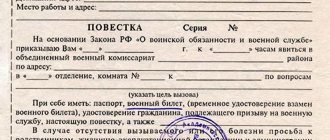All conscripts and men liable for military service have an idea of what a summons to the military registration and enlistment office is. According to this document, it is mandatory to appear at the commissariat. If you don’t come, there will be administrative, and for special evaders, criminal prosecution. But the military commissariat is just a bureaucratic machine, and therefore can miss or forget something. Few people know what to do if the summons seemed to be supposed to arrive, but did not arrive. Will there be a penalty for failing to appear without a summons? Is there a law on appearing at the military registration and enlistment office without a summons?
Agenda
A summons to the military registration and enlistment office is a document that obliges a citizen to appear at the military registration and enlistment office. There are several types of agendas, each of which has its own purpose:
- Clarification of citizen data;
- Medical commission;
- Conscription.
It is important to understand that the draft and summons for the medical commission should arrive only at a certain time - during the conscription campaign. It happens twice a year. Spring - from April 1 to July 15, autumn - from October 1 to December 31.
A summons with a proposal to come to clarify the data is usually issued when it is necessary to enter new information about the marital status, reasons for the delay, as well as the personal data of the citizen liable for military service. Such a document can arrive at any time, and not just at the time of the conscription campaign.
Procedure for delivery of draft notice
If you receive a summons to join the army, no matter how many days before conscription, you need to understand that this document is official and is given against signature, after which it gains legal force. The purpose of the event is to ensure the attendance at the district military registration and enlistment office of young people who have reached conscription age to serve in the ranks of the RF Armed Forces. According to current legislation, conscription of citizens into the army begins at the age of 18.
When is the document served?
The conscription campaign in the Russian Federation is carried out 2 times a year: from 01.04 to 15.07 and from 01.10 to 31.12. In one of these two periods, representatives of military registration and enlistment offices have the right to serve citizens with notifications for the purpose of undergoing conscription activities.
During other periods of the year, any subpoenas are considered illegal. An exception is an invitation to the local commissariat to clarify the conscript’s details. It is also possible to serve a notification for a medical examination at any time, but the date of its completion must coincide with the period of the conscription campaign. If this requirement is not met, the document is invalid and the conscript may ignore it.
Every young man who has reached conscription age immediately finds out through his relatives or friends how many days in advance the authorized bodies send a summons before being sent to the army. Such notification must be provided to the conscript at least 3 days before arrival at the collection point (the date is indicated in the document).
It is also necessary to understand that the sample of a military story is the same, but the purposes of a call to the military commissariat may be different. For example, a young person may receive notice one year before his or her 18th birthday. This suggests that the purpose of the call is to register the citizen with the military.
Methods of serving a summons
According to the legislation of the Russian Federation, authorized persons can only serve a citizen with a summons to the military registration and enlistment office in person or through the employer’s personnel department.
In the first case, representatives of military commissariats hand over the notification personally to the conscript against signature. They can do this anywhere, even on the street, but most often subpoenas are served at the citizen’s place of residence. In this case, the military may be accompanied by police officers authorized to ensure their safety and check the citizen’s documents. But police officers do not have the right to forcibly deliver a conscript to the military registration and enlistment office.
The second legal option for delivering a military notice is at the citizen’s place of work through management or the personnel department. The enterprise may provide for the position of a specialist involved in military registration of employees. Or the summons is served by the head of the company in the presence of an authorized person from the military registration and enlistment office.
Other options for delivering notices are illegal. It doesn’t matter how many days before conscription a citizen of the Russian Federation receives a summons from the local commissariat, the document will not have legal force if the regulations established by law are violated.
Who has the right to serve a notice?
Russian citizens are notified of conscription into the army by order of local military commissariats.
Summons to conscripts have the right to be served by authorized persons:
- Military registration and enlistment office employees;
- Representatives of housing and communal organizations;
- Representatives of executive authorities (city, town, rural);
- Homeowners;
- Heads of companies, enterprises, and other organizations where the conscript works;
- Rectors of universities.
But most often, such notifications are provided personally to Russian citizens liable for military service by military registration and enlistment office employees.
In the absence of a commissariat in the region of residence of the conscript, such powers are vested in local authorities and employers. To carry out the procedure legally, a special commission is created, which includes representatives of the administration, police officers, FSB or prosecutors, and also involves the public.
Places for document delivery
A citizen can be given a draft notice to the military registration and enlistment office directly at his place of residence (registration), in public places, at work, even right on the street.
The main thing is to establish the identity of the conscript. This requires the presence of police officers who have the right to check the personal documents of citizens of the Russian Federation.
Can someone get a summons for a conscript?
The legislation of the Russian Federation does not prohibit the delivery of notices for military service in any place. But there are certain requirements for the procedure itself.
It doesn’t matter how many days before the summons arrives from the military registration and enlistment office, it is important that it is delivered personally to the conscript and he puts his signature on the document.
A notice given to a conscript through relatives or friends, by mail, or inserted into the entrance door at the citizen’s place of registration has no legal force.
Illegal methods of delivering documents to conscripts
Authorized persons of the district military registration and enlistment office can serve summonses on young people of military age, both in the presence of witnesses and independently. And after the citizen, whose personal data is indicated in the notification, signs the tear-off counterfoil, the document acquires legal force.
Illegal notices:
- Left at the conscript’s place of registration at the door or mailbox;
- Sent via Russian Post;
- Passed on through relatives and friends;
- Presented before receiving the results of a medical examination of a citizen and making a decision by the commission on the citizen’s suitability for military service;
- Delivered by unauthorized individuals;
- Awarded during the period of the conscript’s official deferment related to study at a university, treatment and other legal grounds.
Regardless of how many days in advance authorized persons give a citizen of military age a summons to the army, the procedure must be carried out in accordance with the requirements of Russian legislation. Quite often, representatives of regional military registration and enlistment offices hand over such notices to young boys who were minors just yesterday, violating the law.
For example, a conscript signed the detached form of a notice under psychological pressure from the military registration and enlistment office staff. If this fact is proven, the document will not have legal force. To do this, you must submit an application in the appropriate form to higher military organizations, the court or the prosecutor's office.
Service of the summons
If a summons demanding to come to the military registration and enlistment office is not handed over according to the rules, then the conscript has the right not to sign for it and not to come to the military registration and enlistment office. First of all, there is a certain circle of people who can serve such a document. These include:
- Local executive authorities;
- Employees of the military commissariat, including the military commissar;
- Local government bodies;
- Heads of educational institutions, housing offices, as well as employers.
All these persons have the right to hand over the summons to the citizen personally. The military commissariat has the right to send the document by mail. The ideal option is a valuable letter, since, if received, the conscript is required to sign. An ordinary citizen has the opportunity to ignore a registered letter and say that he did not receive it. In such a case, it will be considered that the summons has not been served. Although, according to the new law, a registered letter with notification will also be considered a summons served, which obliges the young man to go to the military registration and enlistment office.
The summons must be served on the person for whom it is intended. Therefore, the addressee must sign for its receipt, regardless of the method of receipt. Only if the conscript's signature is present, the summons is considered served.
Moreover, according to the law, the summons must be served no less than 3 days before the date of arrival.
When do draft notices arrive from the district military registration and enlistment office?
As a rule, until a conscript passes a medical examination and is declared fit for military service, no one has the right to hand over combat notifications. At the same time, it is recommended to know how many days in advance the representatives of the district military registration and enlistment office serve the summons to the army.
Any notices to appear at the military registration and enlistment office must be provided to citizens at least 3 days before the date specified in the document. The procedure for serving documents is regulated by regulations:
- Federal Law No. 53 - 03/28/1998;
- Decree of the Government of the Russian Federation No. 663 – 11.11.06;
- Order of the Ministry of Defense of the Russian Federation No. 400 – 02.10.07.
Also, according to the law, a conscript can be given a summons only during the official conscription campaign: spring – 04/01–07/15; autumn – 01.10-31.12.
Responsibility for failure to appear at the military registration and enlistment office
If the summons was served according to all the rules, and the conscript signed for it, then failure to appear at the military registration and enlistment office is considered evasion of military duties. This is subject to administrative and criminal sanctions. If a conscript does not show up once, and he does not have a valid reason for this, for example, illness, then he will get off with just a warning.
The next step is a fine of 500 rubles. Such a fine is provided for failure to appear at the commissariat, as well as if you change your place of residence or register with a new registration. In addition, a person can be punished with a similar fine for leaving abroad for more than 6 months without warning the military registration and enlistment office.
Repeated violation is also punishable by monetary liability without increasing the amount. Until criminal liability arises. There are several types of punishment for it. The monetary penalty reaches 200 thousand rubles, and imprisonment can reach up to 24 months.
For failure to appear at military training for a man who is in the reserve, the fine also ranges from 100 to 500 rubles.
Failure to appear on summons for service at the unit
If you personally received a summons to gather for service, and you do not have any valid reasons, then a criminal case may be brought against you. In this case, the punishment will be provided on the basis of the law and strictly individually.
Liability can be avoided if you do not receive a summons or do not sign for the notice. It is worth remembering that only you can sign for this document. If your relatives received the summons and signed for it, then it can be considered by law that you have not received the document. It’s another matter if the military registration and enlistment office contacts the Ministry of Internal Affairs, and then they can force you to sign a document and appear at the military registration and enlistment office.
Consequences of evading service
If a citizen does not have serious reasons not to perform military service, then he will not receive a military ID. In addition to fines and liability for evasion, other problems may arise. These include:
- A reprimand from the employer or a fine;
- Inability to work in government bodies and structures;
- Dismissal;
- Problems with official employment;
- Inability to obtain a license to carry a weapon.
- The rarest punishment, which applies exclusively to malicious draft dodgers, is imprisonment for up to 2 years.
Subpoena: what is it?
A summons to the military registration and enlistment office is an official document that obliges a person to appear at a certain time at any government agency. For example, this could be a court, police, investigative department or military registration and enlistment office. In the case of conscripts, a summons to the army is issued to them to undergo a medical commission, which will determine whether they are fit for service or not. The document is also given to a young man before joining the army. If he has already served, he may be summoned to military training. After receiving a summons, it is strictly not recommended to ignore it and hide from the military registration and enlistment office employees. If a young man does not want to serve, he should look for legal options for obtaining a deferment or release, that is, act within the framework of current legislation. The Military Medical College assistance company for conscripts has already helped more than 5,000 guys get a military ID, and it will help you too. Sign up for a free consultation by calling 8(800) 775 10 56 or leave a request on the website.
You need to understand that military registration and enlistment offices have a plan that indicates how many people are subject to conscription. Therefore, exemption is granted only to those who actually have a more or less serious illness. To obtain it, you must undergo an examination in advance, take tests for the military registration and enlistment office, and collect the relevant certificates and medical statements.
If a summons has been received, the young man must appear at the military registration and enlistment office within the specified time frame so as not to be prosecuted.
The inability to visit the commissariat must be confirmed by certificates or documents confirming the valid reason. Valid reasons for failure to appear include:
- the presence of an illness that resulted in temporary disability;
- force majeure (natural disaster);
- serious health condition of close relatives or death.
Types of summons to the military registration and enlistment office
There are several types of summons to the military registration and enlistment office. Among them are those whose purpose:
- clarify the information entered in the conscript’s personal file;
- send for alternative civilian or military service;
- ensure attendance at the meeting of the draft commission.
A summons is a form that must contain certain details. These include: series and document number, personal information of the young man, purpose of the call, time and place of arrival (address of the military registration and enlistment office). At the bottom of the summons is the stamp and signature of the employee who issued it.
If the summons has not arrived
But many conscripts are concerned about the question of what to do if the summons has not arrived. You can just sit and wait, pretending that you are not aware of the start of the conscription campaign. Or remind yourself and come to the military registration and enlistment office. Until recently, a conscript was not responsible for the fact that he was not summoned or forgot to summon him. As a result, the number of draft dodgers reached 164 thousand people.
Now there is a new law on subpoenas to the military registration and enlistment office. It was adopted in the first reading on April 3, 2022. According to the new bill, subpoenas can not only be served in person, but also sent by registered mail with notification. Many conscripts avoid military service precisely by not receiving a summons from the military registration and enlistment office. Now this is impossible. If a conscription campaign has begun, and the conscript has not received a summons, then he is obliged to report to the military registration and enlistment office.
In this case, you can expect a summons until the end of the conscription campaign, but you must appear no later than the start of a new conscription. That is, if the summons did not arrive during the spring draft, then the citizen must appear at the military registration and enlistment office before October 1. If you haven’t received your autumn draft document, you must go to the military registration and enlistment office before April 1.
Didn’t receive a summons: the Supreme Court was deciding whether to consider the conscript a draft dodger
In January 2008, Sergei Davydov* was registered with the military registration and enlistment office and issued a certificate of a citizen subject to conscription (registration certificate). In 2009, the young man entered South Ural State University and received a deferment from conscription until 2013. Then Davydov received another deferment - until August 2022, because he transferred to graduate school. But he was expelled from graduate school earlier, in 2016, “due to the end of his studies.” Apparently, Davydov never defended his Ph.D. thesis.
The young man had almost two years left until his 27th birthday. During this time, he never received a single summons, although there were four calls during this time. But in his registration document there was a note that he must report to the military registration and enlistment office from September 1 to September 5, 2022. But the young man decided that this was not a summons and did not come.
In April 2022, now 27-year-old Davydov turned to the military registration and enlistment office to receive a military ID. The conscription commission enlisted the young man in the reserves, but gave him a “draft dodger” certificate instead of a military ID. She considered that Davydov did not serve without legal grounds. The recipient of such a certificate cannot work in the state and municipal service for 10 years.
This did not suit the young man. He went to court and asked to declare the conclusion illegal and to oblige the draft commission to evaluate the possibility of enlisting him in the reserves as a citizen not subject to conscription due to age. The administrative plaintiff insisted that the military registration and enlistment office did not carry out proper recruitment measures in relation to him.
Was there a notification: the courts differed in their assessment
The Zlatoust City Court of the Chelyabinsk Region partially satisfied Davydov’s claim. He pointed out that the law obliges citizens to appear for conscription only upon summons. In August 2016, South Ural State University sent a certificate to the military registration and enlistment office stating that Davydov had been expelled from the university and that he was subject to conscription. But after that, no summons was sent to the young man. Davydov could not know when and where he needed to come in order to undergo conscription activities. Thus, the plaintiff did not evade military service, the first instance decided and recognized the commission’s conclusion (No. 2a-1456/2019) as unfounded.
The Chelyabinsk Regional Court thought differently. The appeal concluded that the discharge certificate cannot serve as evidence, since there is no evidence that the military registration and enlistment office received it. The plaintiff himself did not apply to the commissariat after the end of the deferment period, although the certificate of a citizen subject to conscription issued to him contained the date of appearance. The entry that Davydov needed to come to the military registration and enlistment office from September 1 to 5, 2022 appeared in his registration record back in 2015.
However, the plaintiff never showed up for conscription, which means that he evaded service, the appeal decided. The court overturned the decision of the first instance regarding the recognition of the commission’s conclusion as illegal and rejected the corresponding claims of Davydov (No. 11a - 10192/2019). The seventh cassation council agreed with the appeal (No. 8a-2946/2019).
Entry on ID – improper notification
A trio of judges, chaired by Igor Zinchenko, supported the first instance in assessing the certificate from the university. The paper, as the Supreme Court indicated, was presented to the court by the defendant himself, who did not deny that he received it.
But after the plaintiff was expelled from graduate school, the military registration and enlistment office did not properly notify him of the need to appear at conscription events. The conscript's card contained Davydov's address, but there is no information that a summons was sent to him. At the same time, there are reports from the district police officer and the head of the department of the Ministry of Internal Affairs for the city district that the military registration and enlistment office did not contact them to establish the whereabouts of the young man.
Just one note on the registration document cannot be considered an appropriate notification of the need to appear at the military registration and enlistment office, the Supreme Court emphasized. Thus, the defendant did not fulfill the notification obligation assigned to him, and Davydov did not complete his service for reasons that were beyond his control. Three judges overturned the decisions of the appeal and the first cassation regarding the recognition of the legal conclusion of the draft commission and upheld the act of the first instance (No. 48-CAD20-6-K7).
“Confirms and develops practice”: experts on the definition
The practice in this category of administrative cases is very extensive. The Supreme Court has repeatedly spoken out on it (No. 32-KG17-41, No. 4-KG18-7, No. 65-KA20-1), says Alexander Peredruk, a lawyer for the human rights organization “Soldiers’ Mothers of St. Petersburg.”
But if before 2022 it was not so uniform, then in recent years the position of the courts has been quite clear, notes Arkady Chaplygin, chairman of the Prizyvnik agency. According to him, the military registration and enlistment office is obliged to summon conscripts by summons, and conscripts may not appear without a summons (except for cases expressly specified in the law). In such a situation, the courts rightly believe that it is impossible to punish conscripts for failure to fulfill their duties by the military registration and enlistment office, the expert explains. Peredruk agrees with him.
The courts take the side of the plaintiffs if there is no evidence in the case that the conscript intentionally avoided serving the summons or did not appear in accordance with the served summons.
Alexander Peredruk, lawyer of the human rights organization “Soldiers’ Mothers of St. Petersburg”
In the Davydov case, according to the lawyer, the Supreme Court not only confirmed the previously formed approach, but also developed it, assessing the nature of the entry in the certificate of the citizen subject to conscription. The court indicated that a note about the need to appear at the military registration and enlistment office cannot be considered a legitimate and sufficient notification to the conscript.
This conclusion is important for practice, since it is potentially applicable in almost every similar dispute: the approximate dates of appearance at the military registration and enlistment office are always indicated in the registration form. But, as the Supreme Court correctly noted, such a record has no legal consequences, since the law clearly links the need for a visit to the military registration and enlistment office with the summons handed to the conscript personally, Peredruk emphasizes.
* – last name and first name have been changed by the editors.
- Kira Klimacheva
- Supreme Court of the Russian Federation
Procedure for receiving registered mail
According to the new bill, a registered letter with notification can be received not only by the conscript, but also by his immediate relatives. At the same time, they will sign the notification, and it will be considered that the conscript has received the summons. At the same time, the fact that the citizen may not be given a summons is not considered in favor of the conscript. There will still be administrative penalties for failure to appear.
Therefore, if there are no valid reasons for the deferment, as well as for receiving the deferment itself, the conscript must appear at the military registration and enlistment office even in the absence of a summons. Now it's the law. Now the conscript himself must take care that you are not considered a draft dodger. If there is no summons, show up at the military registration and enlistment office. There they may hand it over, but otherwise you can become a violator, which will seriously hit your wallet.
If the letter arrived after the date on which you were scheduled to come to the commissariat, then you must go there no later than 3 days after receiving the letter.
Good reasons
All young people of military age who did not appear at the military registration and enlistment office when summoned are draft dodgers. This act is subject to administrative liability, and in some cases, criminal liability. But there are valid reasons for failure to appear on a summons, for which the conscript will not be held accountable.
It is not difficult to remember these reasons, since there are not many of them:
- Illness or injury is the first reason. To confirm this fact, the conscript must provide the appropriate document from a medical institution.
- Death of a close relative. If this misfortune happened on the appointed day, or there was a funeral, then the conscript will not be held accountable. Close relatives in this situation are considered to be: parents, guardians, children, grandparents, spouses.
- Force majeure circumstances, for example, there was no transport to get to the place of conscription, a small child, and there was no one to leave him with. But it is worth remembering that this fact will need to be proven with the appropriate document.
To avoid additional questions from the military registration and enlistment office, call the phone number indicated in the summons and warn about the current circumstances.
Legal deferment from the army
If there is no desire or opportunity to serve, the right decision would be not to run away from the military registration and enlistment office, but to submit all the necessary documents about the due deferment. There are plenty of legitimate reasons not to join the army; you just need to use them correctly. Then there will be no problems with the military registration and enlistment office and the law.
There may be several good reasons why a citizen of military age is exempted temporarily or permanently from service in the Armed Forces. They are divided into several groups.
Health deferments. After passing the medical commission, the conscript is assigned a health group. There are 5 of them in total.
Group “A” means that the young man is completely healthy and fit for service in any units and troops. Group “B” speaks of minor restrictions under which you can be sent to serve only in certain types of troops. Group “B” is assigned to young men who are immediately enlisted in the reserves and can only be called up in wartime according to the rules of mobilization. “G” - a deferment is granted, since the young man is recognized as temporarily unfit for health reasons. Usually for 6-12 months. After the end of the deferment, you must report to the military registration and enlistment office to undergo a second medical examination. Citizens with category “D” cannot serve due to health reasons.
Health is assessed by several specialist doctors in different fields. The overall group is set to the lowest. If a conscript has a diagnosis that requires a deferment or release, then the draft commission should have supporting documents, photographs, and hospital extracts. The more confirmation, the better.
Family circumstances. This is a large group of reasons why a young man may not join the army. First of all, these are cases when the conscript is a single father. The mother may abandon the child, die, or be deprived of parental rights. The next family reason is a seriously ill close relative whom the conscript is caring for or supporting. At the same time, it is important to understand that there should be no persons who can replace the young man in this matter.
Also, young people who have two or more children, as well as one child and a spouse in late stages of pregnancy, are not subject to conscription. In this case, the deferment is, in fact, for life, because it is provided until the children reach adulthood, and it will come later than the upper limit of conscription age.
A short deferment is provided if there is a disabled child. In this case, the young man will not serve in the army until the child is three years old, after which the citizen will again be subject to conscription. Guardians of their minor brothers and sisters are not called upon.
The most common reason for deferment is studying. In this case, there are several options:
- Deferment from the army for schoolchildren. Before receiving a certificate of general education, the conscript will be given a deferment until graduation. Usually such young men are called up in the fall, after October 1;
- For students of technical schools and colleges. Deferment is provided only in case of full-time study and up to 20 years. If a young man under the age of 20 has not completed college, he may well be drafted;
- Deferment for students of higher educational institutions. It is also necessary to study in a full-time educational program at a state university. In this case, the citizen is obliged to enroll after school, and this should not be a second higher education. The benefit is provided only once, for obtaining the first profession. If the learning process is not interrupted, then the deferment applies not only to bachelor’s degrees, but also to master’s degrees. Students of various kinds of religious institutions, such as seminaries, also have every right to defer until the end of their studies;
- Graduate students. Another reason not to go to serve. As a result, it turns out that if a young man immediately after school goes to study and goes through all levels of education in a row, from bachelor to graduate student, then he will not be able to serve, since when he graduates he will already be over 27 years old. In addition, according to the law, citizens with an academic degree are not conscripted into the army.
There are several reasons not to draft a young man into the army at all. This is completing alternative service, citizenship of another country or serving in the ranks of foreign armies.
Fines and punishments
As previously written, you can receive criminal punishment for systematic failure to appear on summonses signed by you personally. The punishment may not be very serious, and sometimes it is worth fearing.
The first measure applicable to a soldier who does not appear at the military registration and enlistment office for military service is a fine. But a certain case may be opened in which your failure to appear at the military registration and enlistment office will be noted. If you want to work in a government agency, this may affect your career in the future.
In addition to a fine of 500 rubles, you may be given administrative liability; the fine will be equal to your income for one and a half years - this is the most serious punishment provided by law in monetary terms.
At the discretion of the authorities and military registration and enlistment office employees, you may be given another punishment, for example, forced labor. You can be held accountable and forced to work for the state for free for two years, but this is the maximum. Oddly enough, this punishment is used very rarely in our country, since it is believed that punishment with money is more effective.
Criminal liability for failure to appear at the military registration and enlistment office on a summons provided by law is 6 months maximum, but in case of malicious evasion it can be increased to two years.
Documents to the military registration and enlistment office and the rights of conscripts
If a conscript wishes to receive a deferment, then it is worth preparing for the conscription campaign in advance. To do this, you need to collect all available documents. If you have health problems, you must undergo an independent medical examination. To confirm family circumstances, you may need certificates of family composition, documents confirming marriage and the presence of children. For students - all possible certificates of study and confirmation of university accreditation.
For consultation and clarification of information, Ministry of Defense hotlines operate in all regions. If a young man at a meeting of the draft commission does not agree with the verdict, he has the right to solve the problem through the court. They must give him the minutes of the commission meeting. In this case, it is better to contact a military lawyer who can properly protect the interests of the young man.
Very often it turns out that the rights of conscripts are violated due to the fact that it is necessary to fulfill the conscription plan. In this case, documents may be lost or the commission may not notice any disease. It is recommended to submit only copies of documents for evaluation in order to keep the originals. It will be more reliable this way.










